They're off! Cameron has been to the Palace. Parliament has dissolved. We have a government and a Prime Minister but no MPs. After months of phoney war, the general election campaign proper is finally upon us.
It was tempting to declare SubScribe an election-free zone, but that seemed like abdication of duty, so this is a blog page for occasional random thoughts.
Any parent of a teenager with upcoming exams would recognise my behaviour of the past week: much skimming of source material and even more displacement activity.
Just as the teenager needs a colour-coded revision timetable, so a blogger needs a logo. There were rosettes to find and fashion. Was the Labour one too big, the Ukip one too low? If the SNP were to be included, what about Plaid Cymru? Oh yes, playing with the Paint tools to extend ribbons, crop and overlay took care of three days, and not a word written.
Then there were brambles outside to be cut down before their host trees started sprouting, and neglected wooden floors to be polished before the family descends for Easter Sunday lunch. And then, joy of joys, the lovely sticker on the telephone exchange at the end of the road pronouncing the arrival of fibre broadband - which meant a whole afternoon of package comparisons and a for-once welcome conversation with a lady from the call centre.
It's all the Daily Mail's fault. As GameoldGirl has noted elsewhere, it has been in full cry this week and when you add its election coverage into the mix, it's been enough to make any media observer want to shut up shop.
Time was that newspapers reported what the candidates had to say on their news pages and offered opinions on the opinion pages. How old-fashioned can you get? I clearly remember a not-so distant general election campaign where The Times's news coverage was masterminded by one Michael Gove. It would, he declared, be driven by events. Various set-pieces would be prepared, but he would be ever-willing to kill his babies. It was the first time I had heard that expression. That is not the only aspect of the campaign that I remember: another was the establishment in a side office of a little unit whose task was to monitor and audit published news stories to ensure that coverage was balanced.
So there we had a highly political news editor in charge of determinedly fair and open-minded campaign reporting. All sides were also represented in the comment pages. The paper eventually made its thoughts about who would make the best Prime Minister known in a leading article in the closing days of the campaign.
Nostalgia, eh?
It was tempting to declare SubScribe an election-free zone, but that seemed like abdication of duty, so this is a blog page for occasional random thoughts.
Any parent of a teenager with upcoming exams would recognise my behaviour of the past week: much skimming of source material and even more displacement activity.
Just as the teenager needs a colour-coded revision timetable, so a blogger needs a logo. There were rosettes to find and fashion. Was the Labour one too big, the Ukip one too low? If the SNP were to be included, what about Plaid Cymru? Oh yes, playing with the Paint tools to extend ribbons, crop and overlay took care of three days, and not a word written.
Then there were brambles outside to be cut down before their host trees started sprouting, and neglected wooden floors to be polished before the family descends for Easter Sunday lunch. And then, joy of joys, the lovely sticker on the telephone exchange at the end of the road pronouncing the arrival of fibre broadband - which meant a whole afternoon of package comparisons and a for-once welcome conversation with a lady from the call centre.
It's all the Daily Mail's fault. As GameoldGirl has noted elsewhere, it has been in full cry this week and when you add its election coverage into the mix, it's been enough to make any media observer want to shut up shop.
Time was that newspapers reported what the candidates had to say on their news pages and offered opinions on the opinion pages. How old-fashioned can you get? I clearly remember a not-so distant general election campaign where The Times's news coverage was masterminded by one Michael Gove. It would, he declared, be driven by events. Various set-pieces would be prepared, but he would be ever-willing to kill his babies. It was the first time I had heard that expression. That is not the only aspect of the campaign that I remember: another was the establishment in a side office of a little unit whose task was to monitor and audit published news stories to ensure that coverage was balanced.
So there we had a highly political news editor in charge of determinedly fair and open-minded campaign reporting. All sides were also represented in the comment pages. The paper eventually made its thoughts about who would make the best Prime Minister known in a leading article in the closing days of the campaign.
Nostalgia, eh?
This time round most papers had made up their minds long before MPs packed up their pencil cases for the end of term, and five weeks of hustings are unlikely to change any of their opinions. The Telegraph, Mail, Mirror and Sun seem to think their role is not to tell their readers what the politicians are saying, but to tell them what is wrong (or, occasionally, right) with what the politicians are saying.
If Labour wins the election, or comes to an accommodation with one or more minority parties, Ed Miliband will represent Britain in the world. Some - most - of our national newspapers would prefer that that did not happen, but they risk our future international standing by treating any potential Prime Minister so contemptuously. "Red Ed" splash headlines are not a good idea. Nor, indeed, is it wise to call Cameron "Dave" in a straight news story.
SubScribe has been looking most closely at the Mail this week, initially driven by Stephen Glover's "conundrum" that "so far in the election campaign" no party except for Ukip had mentioned immigration. That was on day two - well into the campaign.
If Labour wins the election, or comes to an accommodation with one or more minority parties, Ed Miliband will represent Britain in the world. Some - most - of our national newspapers would prefer that that did not happen, but they risk our future international standing by treating any potential Prime Minister so contemptuously. "Red Ed" splash headlines are not a good idea. Nor, indeed, is it wise to call Cameron "Dave" in a straight news story.
SubScribe has been looking most closely at the Mail this week, initially driven by Stephen Glover's "conundrum" that "so far in the election campaign" no party except for Ukip had mentioned immigration. That was on day two - well into the campaign.
For the first part of the week, the Mail was focused on its "sale of private information" investigation, but it still found time to smear Miliband through Martin Freeman and, unforgiveably, Isis. There was a lot of hypocrisy to be confronted - from Red Ed (zero hours), Freeman (tax avoidance) and Hampstead socialists (everything really). The Labour leader was mocked for shedding a tear over a film about the miners' strike ("mawkish Leftie propaganda") and for suggesting that a future 007 might be a woman ("PC Galore" - which, you have to concede, is a great headline).
The most outrageous bit of innuendo came with yesterday's front-page heading "Runaway Jihadi's father is Labour activist", accompanied by a photograph taken in December of Miliband with Rochdale councillor Shakil Ahmed. Another screaming example of a newspaper reporting something that is true, yet conveying a message that could hardly be described as the truth.
The story describes Ahmed as a well-respected councillor and there is nothing in the copy to suggest that he has done anything wrong. Yet the presentation encourages the reader to think jihad=bad, Labour=bad, activist=bad, ergo Miliband=bad.
Miliband is not the only enemy. There have been a couple of pops at the Liberals and the leaders' debate threw up a new villain. A woman who dares to succeed at something beyond home-making and motherhoold, Nicola Sturgeon has now been anointed as the most dangerous woman in Britain.
The most outrageous bit of innuendo came with yesterday's front-page heading "Runaway Jihadi's father is Labour activist", accompanied by a photograph taken in December of Miliband with Rochdale councillor Shakil Ahmed. Another screaming example of a newspaper reporting something that is true, yet conveying a message that could hardly be described as the truth.
The story describes Ahmed as a well-respected councillor and there is nothing in the copy to suggest that he has done anything wrong. Yet the presentation encourages the reader to think jihad=bad, Labour=bad, activist=bad, ergo Miliband=bad.
Miliband is not the only enemy. There have been a couple of pops at the Liberals and the leaders' debate threw up a new villain. A woman who dares to succeed at something beyond home-making and motherhoold, Nicola Sturgeon has now been anointed as the most dangerous woman in Britain.
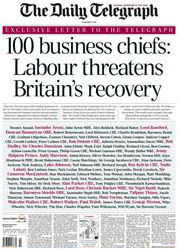
Nor is the Mail alone in its partisan approach. We have to assume that the Telegraph's front on Wednesday was not intended as an April Fool. But nor was it journalism; it was blatant propaganda. And, like the Mail, the Telegraph has since homed in on Sturgeon as the bogeywoman.
The Express meanwhile produced a series of "Tories good, Labour bad" puffs, the Sun ran spreads on how Miliband was bad for business, and the Times had "panic" in the markets driving down sterling. Naughty. The markets don't like uncertainty and election campaigns by definition breed uncertainty. Financial experts were predicting in the middle of last year that the pound would fall against the dollar through 2015, and the movement this week had more to do with Andrew Haldane's talk about even lower interest rates than with any fear of Ed Miliband in No 10. Or Ed Balls in No 11.
And don't think there's any less partisanship on the other side of the battle, just fewer papers. But more on that another day.
The Express meanwhile produced a series of "Tories good, Labour bad" puffs, the Sun ran spreads on how Miliband was bad for business, and the Times had "panic" in the markets driving down sterling. Naughty. The markets don't like uncertainty and election campaigns by definition breed uncertainty. Financial experts were predicting in the middle of last year that the pound would fall against the dollar through 2015, and the movement this week had more to do with Andrew Haldane's talk about even lower interest rates than with any fear of Ed Miliband in No 10. Or Ed Balls in No 11.
And don't think there's any less partisanship on the other side of the battle, just fewer papers. But more on that another day.

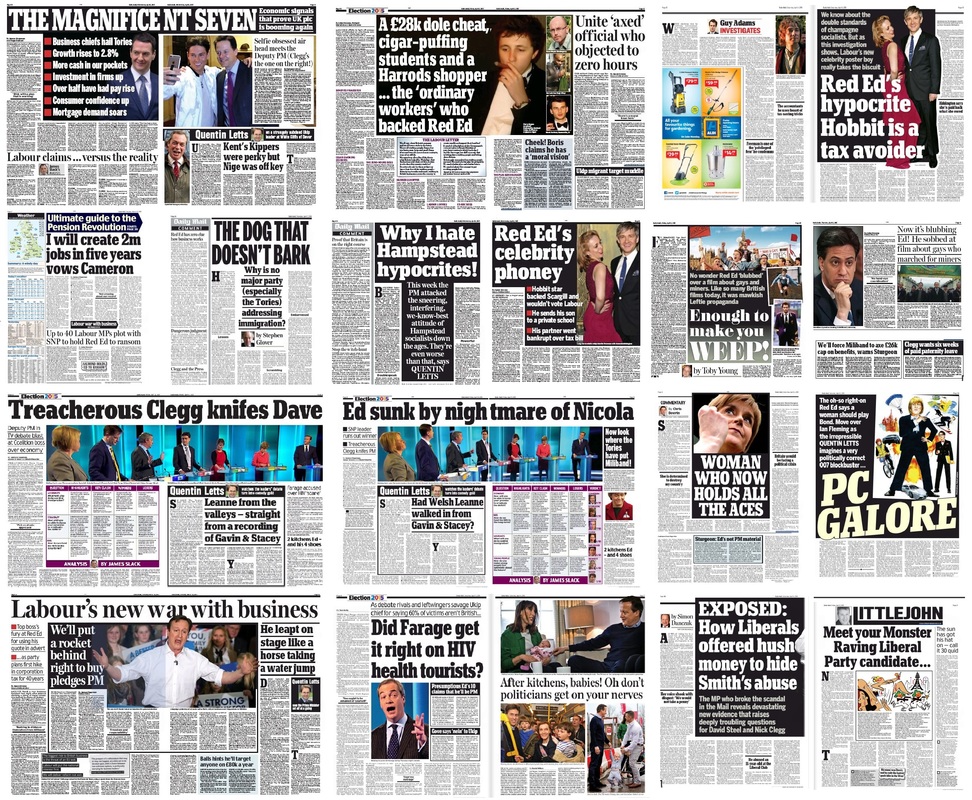
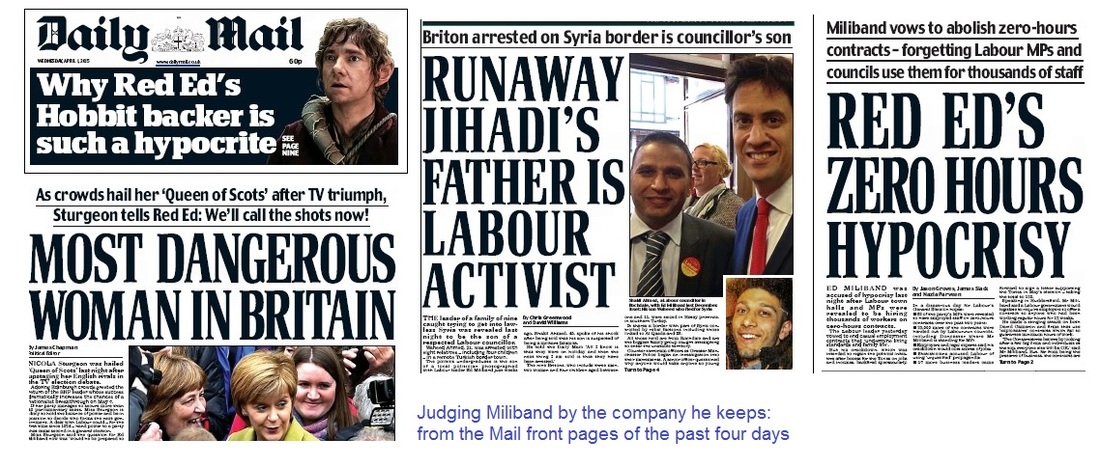
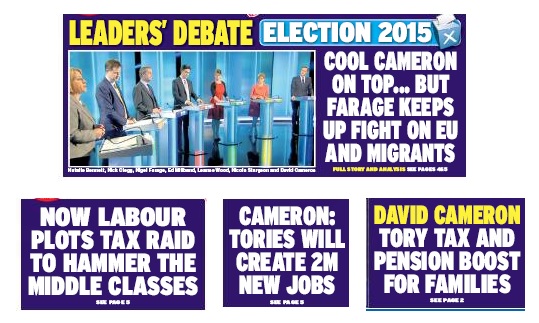
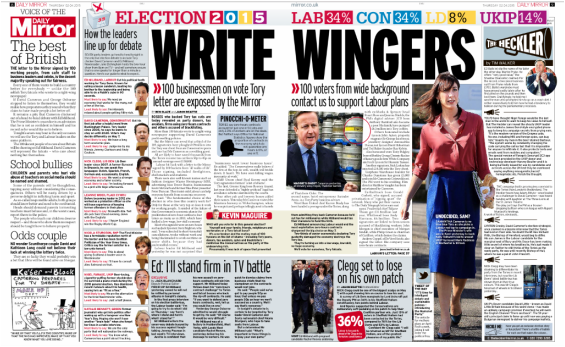
 RSS Feed
RSS Feed


